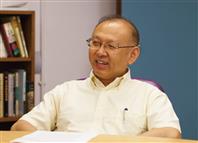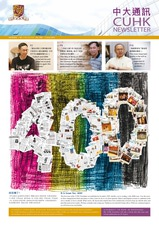When did your interest in physics start?
I've loved machines when I was little, and I’d install radios myself. When I came across the subject of physics in junior secondary school, I fell in love with it. The stories of physics were fascinating and I wanted to know more.
In what way did your university life differ from those of students nowadays?
I must say both have their merits. I was among the first students to take the nationwide university entrance examination reinstated after the Cultural Revolution. When I entered university, I’d already completed secondary studies for a couple of years. The age difference was huge in our class, the youngest one was just 15, and the oldest was nearly 40. This was a precious opportunity to us and we had a thirst for learning. We made use of the exercise books on higher mathematics and attempted each and every question from beginning to end. This was the typical student life for most of us.
We devoted an enormous amount of time to core subjects, and what we learned was a lot more difficult than what students are learning nowadays. All-round education is what we give our students. They can access the Internet and have broader horizons about global affairs. In our time, we were more simple-minded since China was rather secluded and most people lacked knowledge about the outside world. In the post-Cultural Revolution era, we just wanted to focus on academic work and had no interest to participate in student activities.
The scope of physics is all-encompassing. How did you choose which area to focus on?
It was a random match, just like anything else. When I was doing post-doctoral research, I went to a lecture on turbulence, and it was interesting. I later came to Hong Kong, and bit by bit my interest grew, and more research was done. Hong Kong has an advantage because researchers can pick any topic we want, and no one would bother you.
What kind of vision must scientists have?
The most important quality is the will to explore or eagerness to delve into a problem, hoping to find an answer and contributing to the advancement of mankind. The publishing of academic papers and the quest for increased output should not play a part. I want to do something which I’d be proud of upon retirement. If my aim is to issue papers, I can boost the figures. We need to decide: should I write? Or should I do something else that can make a change? We only have 24 hours a day. I should do something that I am proud of, and dedicate my strengths for the benefit of physics research.
How do you overcome a setback in scientific research?
Adopt an open mind and don’t give up easily. The purpose of doing experiments is to assess or check a phenomenon we know or have yet to know. That’s not an easy task. You need to invent methods to collect data. If it doesn't work, we must reflect on the experimental process—is there anything wrong with that method? Or is the apparatus not suitable? You should not assume a reason. Man can only obey nature. We can guess if such a phenomenon exists or not, but it might not manifest itself in the ways you think. We must be objective in analysing our experiments. We must get rid of obvious errors one by one. If it ends up that way, we must accept it as it is.
What are the advantages and limitations of Hong Kong in nurturing physics talent?
Few resources are available in Hong Kong, and societal values are not that favourable to students who want to pursue a career in fundamental scientific research and hold on to their ideals. In the US and in European countries, physics graduates are regarded as more competent than they are here, and many firms love to hire them. Hong Kong lags behind that of international society in this aspect. But the good news is that Hong Kong’s geographical proximity to China and its role as a hub of eastern and western cultures can help bridge the gap between China and the world, and allow a free flow of scientific personnel and expertise. Besides, the mathematics and science training of local secondary students are of a high standard, and this is beneficial to nurturing local talent.
What have been your happiest moments in CUHK?
We need many generations of young talent to keep our society moving. Here, I have a chance to teach and nurture young students. Seeing them become the pillars of society and making contributions is my happiest moment. Of course, the kind of research I did also brings me happiness. But in the long run, generally speaking my teaching career is far more fruitful than my papers. The University has provided a liberal environment, and it would be better if more resources can be made available. 


































































































































































Social Bookmarks